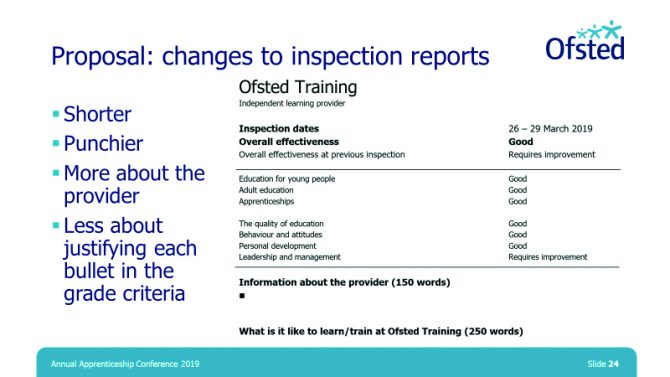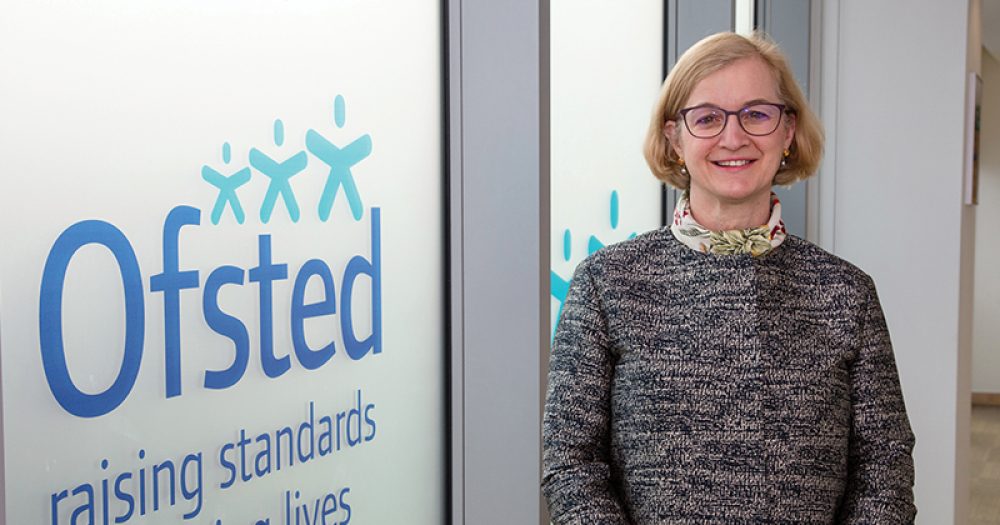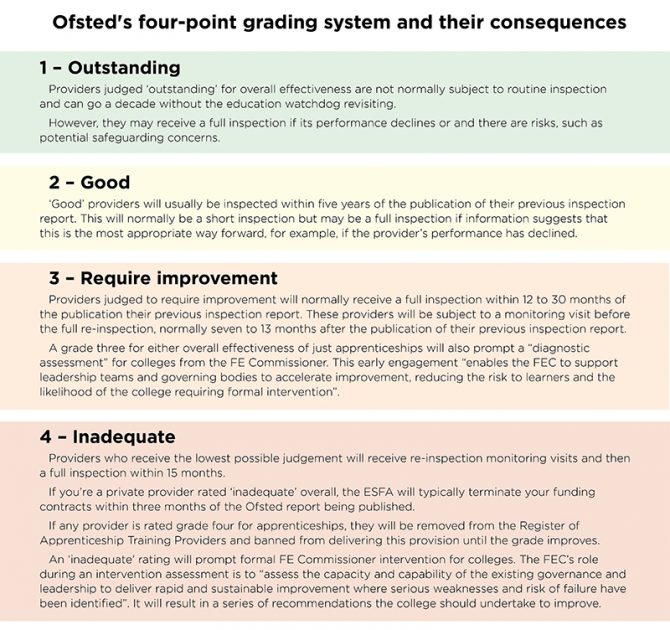Ofsted has today published its new and final education inspection framework that will come into effect from September.
It follows a three-month public consultation, which prompted more than 15,000 responses – the highest number the education watchdog has ever received.
A new FE and skills inspection handbook has been created as a result, which includes a number of changes to the way inspections are carried out in the sector.
FE Week has gone through the 63-page document as well as Ofsted’s 39-page consultation response and listed what it means for FE providers.
Number of provision types reduced to 4 – but WILL include high needs
Arguably the most controversial proposed change for FE was to reduce the current six provision types graded in inspection reports: 16 to 19 study programmes; adult learning programmes; apprenticeships; traineeships; provision for learners with high needs and; full-time provision for 14- to 16-year-olds.
Ofsted wanted to cut these to just three: education programmes for young people; apprenticeships; and adult learning programmes
Half of respondents in the consultation agreed or strongly agreed that reducing them would make inspection reports more “coherent and inclusive” but around one in five disagreed, mainly because of the exclusion of the “high needs” grade.
“Often, the concern was that this would lead to providers reducing the priority given to high-needs provision and not making its quality sufficiently clear, especially in providers that have a small proportion of learners with high needs,” Ofsted said.
As a result, the education watchdog has been “persuaded” and will include a category specifically for high needs in FE reports, along with education programmes for young people; apprenticeships; and adult learning programmes.
Clare Howard, chief executive of Natspec, which represents specialist FE providers, welcomed the U-turn and said it is “right that provision for learners who attract high needs funding is inspected and graded alongside the other funding streams for young people, apprenticeships and adult learning”.
Shift in focus to the “quality of education” rather than data
One of Ofsted’s most supported moves in developing the new inspection framework has been the promise to put “less emphasis” on data, such as achievement rates, and more on progress and destinations.
The inspectorate has confirmed it will proceed with its headline proposal for a new ‘quality of education’ judgement, after it received support from three quarters of respondents.
“Many understood how this would help reduce the incentives for schools and colleges to focus on just achieving better published outcomes at the expense of a rounded education,” Ofsted said.
It means that inspectors will make judgements on the following areas for FE providers: overall effectiveness, and four key judgements: quality of education; behaviour and attitudes; personal development; and leadership and management (see image below for example new FE report).

Four-point grading system here to stay – but new timescale for re-inspecting grade 3s
All inspection judgements will continue to be awarded under the current four-point grading scale: outstanding; good; requires improvement; and inadequate.
Ofsted said reports will be redesigned and shortened to only give the key information about each provider.
Each overall effectiveness grade will continue to carry specific consequences (click image to read what each means) for FE providers.
Providers that are judged ‘requires improvement’ overall will have the timescale for their next full inspection extended from 12 to 24 months to 12 to 30 months. This will “allow us to recognise whether rapid improvement has taken place or whether it may need more time,” Ofsted said.
A new model for short inspections – but no on-site planning
As is the case under current Ofsted rules, providers graded ‘good’ for overall effectiveness will usually be inspected within five years of the publication of that inspection report, and most will receive a short inspection. This will “determine primarily whether the quality of education/training that learners receive is good”.
Ofsted said these inspections will change from September to focus on particular aspects of the provision – principally the quality of education, safeguarding and leadership – as a “subset of the full EIF criteria, while allowing the lead inspector some discretion”.
The education watchdog had proposed that inspectors would arrive at a provider the day after they are notified of a short inspection, to complete planning the visit on-site, but providers voiced concern that the move would “effectively reduce the notification period and be the cause of stress and workload in providers”.
“Following the outcomes of the consultation and our experience on pilots, it is not clear that on-site planning is always beneficial to providers and inspectors,” Ofsted said, adding it will not move forward with the proposal.
Campus-level inspections ruled out for now
Ofsted previously said that if “more granulated performance data” was available it would be open to performing the inspections, which are being called for by large college groups such as NCG.
But in an interview with FE Week in November, chief inspector Amanda Spielman (pictured) ruled out introducing campus-level inspections in the new framework for 2019.
Its exclusion can be blamed on a lack of performance data for individual campuses from the Department for Education.
New provider and merged college inspection timescales to remain the same
Ofsted will continue to carry out a monitoring visit within 24 months to any provider that becomes newly, directly and publicly funded to deliver education training.
When a provider receives one or more insufficient progress judgements, it will normally receive a full inspection within six to 12 months of the publication of the monitoring visit report.
A newly merged college will receive a full inspection within three years of the merger, and will be treated as a “new” college – meaning it will not carry forward any inspection grades from predecessor colleges.
Those with an overall effectiveness grade of ‘requires improvement’ or ‘inadequate’ at one or more of the predecessor colleges will normally receive a monitoring visit before the first full inspection.









Interesting statement under Leadership and Management, that states:-
“leaders’ high expectations of all learners”.
They usually do have high expectations, but it needs to be relevant to the current society we live in, as many learners believe they have a ‘right’ to succeed with minimum effort.
Recently, as a result of the post-16 education review, there have been numerous ‘mergers’ with sometimes tens of miles between campuses.
‘Campus-level inspections ruled out for now’ is not very helpful to the hundreds of parents and potential students looking to the FE sector for their A-level studies. 3+ campuses may be delivering the same A-levels with no Ofsted differentiated grading available. Strengths and weaknesses need to be identified to enable the sharing of good practice. The token cross-college curriculum meetings a couple of times per year are unlikely to deliver high quality performance across the campuses.
There was a time when free standing AS results/grades provided feedback annually, but with 2 year programmes students’ national grading performance comes just after they have completed their studies.
Monitoring ‘destinations’ has value but seems fraught with ambiguity and doubt about the permanency. However, Lord Kenneth Baker will be pleased as he raises this issue when his UTC ‘vanity project’ hits the buffers and he claims the UTCs provide excellent destination outcomes.